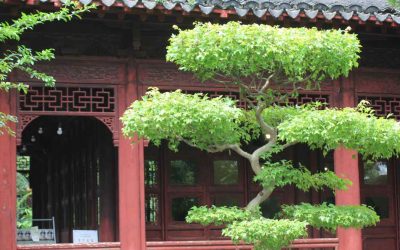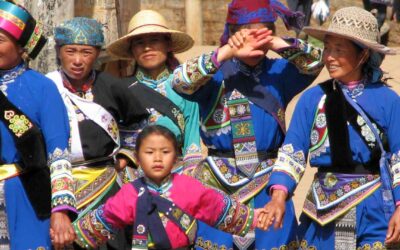Funeral Masks of the Zhuang people in nationalities Museum of Kunming
Known as Longyawai Masks, they are funeral ceremony masks popular in the Zhuang communities of Wenshan Autonomous Prefecture, on the east of Yunnan Province.
The masks are shaped as a lion, they are in fact a cow head called «Longyawai», a gift given by the living to the dead, symbolizing that is a real cow for feeding them in the afterlife. The purpose is to let the dead live a carefree life in underworld with no concern of the human world.
These masks are made of paper pasted on a bamboo frame and are used together with two grim face masks.
Three people wear the three masks to dance on the day commemorating the dead and the following day for the funeral procession.

The museum exhibits three large masks, one with a lion’s head, one cow’s head and one with a shepherd’s head. They are very elaborate and of complex design, with huge mouths, eyes like round mirrors, and sometimes with fabrics hanging to cover the wearer. There are two smaller and simpler ones, one with the face of a monkey, used by the companions in the procession.
Yunnan Nationalities Museum, in Kunming, has one of the best collections of masks in China.
References:
–Masks in the Yunnan Nationalities Museum. Download the free book.
Last posts
The Primitivist: The Taoist Philosopher of Simplicity
The Primitivist: The Taoist Philosopher of Simplicity The Taoist classic Zhuangzi is not the work of a single philosopherAnyone who takes a closer look at the foundational works of Taoism will quickly discover that the book known as Zhuangzi was not entirely written...
An Old Book on the Sani-Yi Minority
An Old Book on the Sani-Yi Minority One may wonder whether it makes any sense to read, in the first decades of the 21st century, a book written at the end of the 19th. Clearly, the person who has spent some of their time translating it, revising it, updating the old...
Praise for the book on Chinese characters
Praise for the book on Chinese characters Good News! I'm happy to share that my book Chinese Characters: An Easy Learning Based on Their Etymology and Evolution has been selected by BookAuthority.org as one of The Best Etymology Books for Beginners! BookAuthority...







